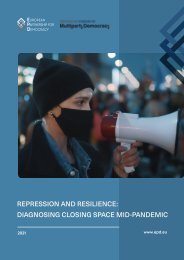Thinking Democratically: A Comprehensive Approach to Countering and Preventing Shrinking Space
Create successful ePaper yourself
Turn your PDF publications into a flip-book with our unique Google optimized e-Paper software.
The reform of political party laws <strong>and</strong> elec<strong>to</strong>ral laws <strong>to</strong> fit the preferences of the ruling party is a<br />
recurring tactic <strong>to</strong> create an uneven playing field. In many cases, political parties are free <strong>to</strong> exist<br />
<strong>and</strong> operate, without any legal hurdles that prevent participation <strong>and</strong> without any obvious<br />
manipulation or rigging of elections. However, the elec<strong>to</strong>ral system <strong>and</strong> campaign regulations put<br />
opposition parties at a major disadvantage vis-à-vis the incumbent as the rules of the game ensure<br />
power remains concentrated in the h<strong>and</strong>s of a small political elite. The elec<strong>to</strong>ral process is then<br />
rendered meaningless as it is not representative, inclusive or participa<strong>to</strong>ry.<br />
Reforms of elec<strong>to</strong>ral law can often restrict space for contestation through high barriers <strong>to</strong> entry,<br />
either through registration requirements or the elec<strong>to</strong>ral threshold (Georgia, El Salvador, Indonesia,<br />
Guatemala). In Indonesia, for instance, the verification process for parties <strong>to</strong> participate in elections<br />
became so strict in 2014 that the number of political parties decreased from 48 <strong>to</strong> 12. This allows big<br />
parties – both ruling parties <strong>and</strong> major opposition parties – <strong>to</strong> maintain their dominance, while limiting<br />
the ability of small <strong>and</strong> new political parties <strong>to</strong> compete. In Guatemala, such high barriers <strong>to</strong> entry<br />
are combined with highly flexible operating requirements, giving established political parties a pass<br />
on poor performance on transparent campaigning <strong>and</strong> inclusiveness, while ruling out competition<br />
from new players. This greatly restricts the options available for voters <strong>and</strong> political contestation in<br />
general.<br />
The purposeful obstruction of reform may also be a strategy adopted <strong>to</strong> maintain the existing unlevel<br />
playing field. In many countries such a problematic regula<strong>to</strong>ry system was inherited from the past,<br />
so one cannot speak of a major attack on the political playing field. For instance, the elec<strong>to</strong>ral<br />
framework of Guatemala was a remnant of the end of the Civil War which reproduced a cycle of<br />
crises – until the reforms in 2016 brought about some change. In such cases, the attack on democratic<br />
space occurs through the efforts <strong>to</strong> prevent reform <strong>and</strong> uphold the status quo. In Guatemala, for<br />
instance, many political parties tried for over 30 years <strong>to</strong> preserve closed elec<strong>to</strong>ral lists, as these<br />
gave complete control <strong>to</strong> parties <strong>and</strong> deprived citizens of true elec<strong>to</strong>ral accountability mechanisms.<br />
In El Salvador, the case study concluded that “the elec<strong>to</strong>ral system had been designed as a cartel <strong>to</strong><br />
keep those who are part of it in competition <strong>and</strong> <strong>to</strong> keep outsiders away”. 51<br />
One detrimental result of such skewed elec<strong>to</strong>ral systems is that voting becomes the least effective<br />
way <strong>to</strong> effect change. “While ggroups of citizens may be free in formulating <strong>and</strong> articulating their<br />
preferences, the tilted elec<strong>to</strong>ral rules bear negatively on weighing those preferences equally in the<br />
conduct of the government”. 52 This strip elec<strong>to</strong>ral processes of their functions for enabling<br />
participation, accountability <strong>and</strong> representation.<br />
51<br />
See El Salvador case study summary, Annex 6.2<br />
52<br />
See Georgia case study summary, Annex 6.4<br />
24

















